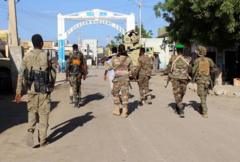In a press conference, Zelensky asserts that Witkoff’s comments threaten Ukraine’s sovereignty and aligns with Russian narratives.
Zelensky Challenges U.S. Envoy Over Alleged Russian Influence in Peace Talks

Zelensky Challenges U.S. Envoy Over Alleged Russian Influence in Peace Talks
Ukrainian President Zelensky expresses concerns over U.S. envoy Witkoff’s statements on territorial negotiations with Russia.
The article text:
Ukraine's President Volodymyr Zelensky has vocally criticized U.S. special envoy Steve Witkoff, accusing him of "spreading Russian narratives" following remarks about the possibility of a peace deal between Russia and Ukraine being linked to the status of five specific Ukrainian regions. This came after Witkoff's recent five-hour meeting with Russian President Vladimir Putin, where he suggested on Fox News that the resolution of the war would hinge on "these so-called five territories."
"My concern is that Mr. Witkoff has adopted a strategy akin to that of the Russian side," Zelensky stated during a press conference in Kyiv on Thursday. "This is quite dangerous, as it could involve promoting Russian narratives, whether consciously or unconsciously."
The regions in question, according to Witkoff, are the Donetsk, Luhansk, Zaporizhzhia, and Kherson regions, all currently under significant Russian military occupation. The fifth region, Crimea, was annexed by Russia in 2014—a move that the international community does not recognize.
"The territories are ours, they belong to our people—past, present, and future," Zelensky emphasized, showcasing his stance on the territorial integrity of Ukraine and exuding frustration over the envoy's comments, which he perceives as detrimental to the Ukrainian cause.
Witkoff also expressed a belief that achieving peace could reshape U.S.-Russia relations and unlock "compelling commercial opportunities" fostering regional stability. This controversial comment sparked further discontent from Zelensky, who previously criticized Witkoff's competence, suggesting that he is more suited for business than for addressing military conflicts.
Meanwhile, Donald Trump revisited his criticisms of Zelensky, softening his stance by acknowledging he does not hold the Ukrainian leader responsible for the war's start. Nonetheless, he conveyed dissatisfaction regarding Zelensky’s leadership in the crisis, stating, "I'm not exactly thrilled with the fact that that war started."
In a separate yet related commentary, Zelensky revealed "information" regarding Chinese arms supplies to Russia, indicating that Chinese entities may be producing weapons on Russian soil. This statement comes amid a backdrop of China positioning itself as a neutral party in the conflict and responding critically to Zelensky's earlier claims about Chinese nationals fighting for Russia.
With escalating tensions and shifting diplomatic relationships, Ukraine's ongoing struggle remains a focal point of international discussions, particularly those involving the U.S. and Russia.
Ukraine's President Volodymyr Zelensky has vocally criticized U.S. special envoy Steve Witkoff, accusing him of "spreading Russian narratives" following remarks about the possibility of a peace deal between Russia and Ukraine being linked to the status of five specific Ukrainian regions. This came after Witkoff's recent five-hour meeting with Russian President Vladimir Putin, where he suggested on Fox News that the resolution of the war would hinge on "these so-called five territories."
"My concern is that Mr. Witkoff has adopted a strategy akin to that of the Russian side," Zelensky stated during a press conference in Kyiv on Thursday. "This is quite dangerous, as it could involve promoting Russian narratives, whether consciously or unconsciously."
The regions in question, according to Witkoff, are the Donetsk, Luhansk, Zaporizhzhia, and Kherson regions, all currently under significant Russian military occupation. The fifth region, Crimea, was annexed by Russia in 2014—a move that the international community does not recognize.
"The territories are ours, they belong to our people—past, present, and future," Zelensky emphasized, showcasing his stance on the territorial integrity of Ukraine and exuding frustration over the envoy's comments, which he perceives as detrimental to the Ukrainian cause.
Witkoff also expressed a belief that achieving peace could reshape U.S.-Russia relations and unlock "compelling commercial opportunities" fostering regional stability. This controversial comment sparked further discontent from Zelensky, who previously criticized Witkoff's competence, suggesting that he is more suited for business than for addressing military conflicts.
Meanwhile, Donald Trump revisited his criticisms of Zelensky, softening his stance by acknowledging he does not hold the Ukrainian leader responsible for the war's start. Nonetheless, he conveyed dissatisfaction regarding Zelensky’s leadership in the crisis, stating, "I'm not exactly thrilled with the fact that that war started."
In a separate yet related commentary, Zelensky revealed "information" regarding Chinese arms supplies to Russia, indicating that Chinese entities may be producing weapons on Russian soil. This statement comes amid a backdrop of China positioning itself as a neutral party in the conflict and responding critically to Zelensky's earlier claims about Chinese nationals fighting for Russia.
With escalating tensions and shifting diplomatic relationships, Ukraine's ongoing struggle remains a focal point of international discussions, particularly those involving the U.S. and Russia.























